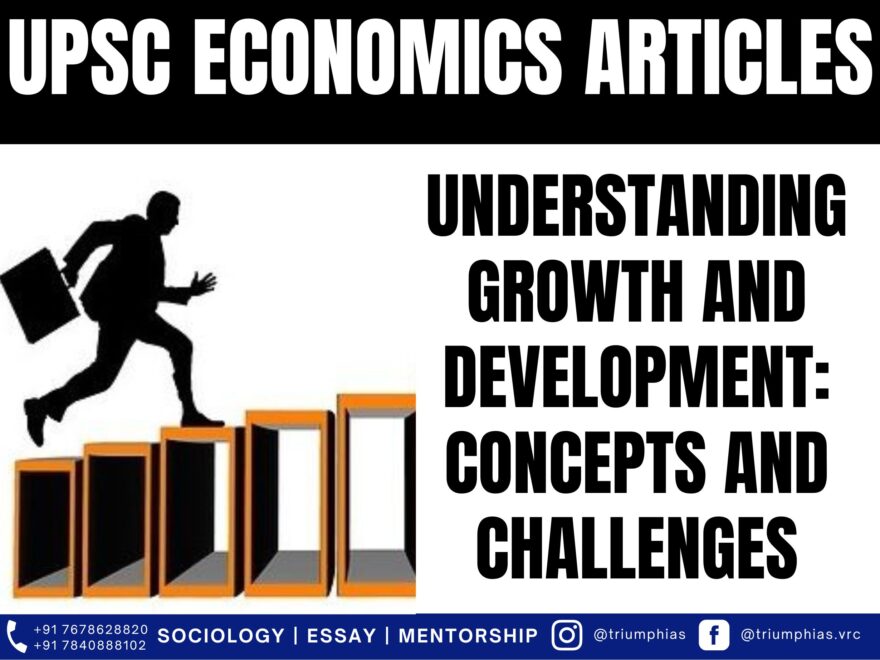Growth and Development
(Relevant for Economic Section of General Studies Paper Prelims/Mains)

Growth, in basic terms, can denote a transition from uncomplicated to more sophisticated forms. It represents a gradual transformation in dimensions and/or maturity, frequently occurring over a specific period. While growth is commonly perceived as a progressive occurrence, it’s noteworthy that negative growth can also be observed within the economic context. The paramount characteristic of growth is its quantifiability; it can be objectively measured.
Diverse dimensions of growth manifest across a range of scopes, including Economic Growth, Social Growth, Cultural Growth, Human Growth, and National Growth.
Development
Development signifies the “enhancement in the economic and societal circumstances of a nation.” More precisely, it pertains to improvements in the management of a region’s natural and human assets, aimed at generating prosperity and elevating the quality of people’s lives. Consequently, development encompasses a multidimensional progression that encompasses alterations in societal frameworks, prevailing attitudes, and national establishments. This is coupled with the acceleration of economic advancement, the mitigation of inequalities, and the eradication of poverty. Development is not only a tangible actuality but also a state of mentality that strives for a superior existence. Three fundamental principles stand as practical benchmarks for comprehending development. These include:
- Sustenance: The objective of development revolves around establishing an environment where individuals can broaden their capabilities and opportunities, benefiting both present and future generations.
- Self-esteem: It involves a sense of value and self-regard, free from manipulation by others for their individual motives. Development is legitimized as an aspiration due to its fundamental significance in garnering esteem.
- Freedom to transcend subjugation: Freedom should be perceived as liberation from degrading material life circumstances and the chains of societal bondage to nature, ignorance, external influences, hardship, institutions, and dogmatic convictions.
Objectives of Development
The three aims of development encompass:
- Enlarging the accessibility and broadening the dissemination of fundamental life-sustaining necessities, such as nourishment, housing, healthcare, and safety.
- Elevating living standards, encompassing increased incomes, augmented job opportunities, improved education, and heightened emphasis on cultural and humanistic principles. These enhancements contribute not solely to elevating material well-being, but also fostering elevated individual and national self-respect.
- Enriching the array of economic and societal options accessible to individuals and nations, liberating them from subservience and dependency. This liberation extends not only to relationships with other individuals and nation-states but also extends to the shackles of ignorance and human suffers.
Challenges in the Way of Development
- Corruption
- Over exploitation of natural resources
- Dependence on primary products as raw materials
- Misuse of foreign assistance
- Misguided priorities
- Cultural restrains
To master these intricacies and fare well in the Sociology Optional Syllabus, aspiring sociologists might benefit from guidance by the Best Sociology Optional Teacher and participation in the Best Sociology Optional Coaching. These avenues provide comprehensive assistance, ensuring a solid understanding of sociology’s diverse methodologies and techniques.
growth, development, economic growth, social growth, cultural growth, human growth, national growth, objectives of development, principles of development, challenges in development, prosperity, societal improvements, economic advancement, quality of life, growth, development, economic growth, social growth, cultural growth, human growth, national growth, objectives of development, principles of development, challenges in development, prosperity, societal improvements, economic advancement, quality of life, Best Sociology Optional Coaching, Sociology Optional Syllabus.

Choose The Best Sociology Optional Teacher for IAS Preparation?
At the beginning of the journey for Civil Services Examination preparation, many students face a pivotal decision – selecting their optional subject. Questions such as “which optional subject is the best?” and “which optional subject is the most scoring?” frequently come to mind. Choosing the right optional subject, like choosing the best sociology optional teacher, is a subjective yet vital step that requires a thoughtful decision based on facts. A misstep in this crucial decision can indeed prove disastrous.
Ever since the exam pattern was revamped in 2013, the UPSC has eliminated the need for a second optional subject. Now, candidates have to choose only one optional subject for the UPSC Mains, which has two papers of 250 marks each. One of the compelling choices for many has been the sociology optional. However, it’s strongly advised to decide on your optional subject for mains well ahead of time to get sufficient time to complete the syllabus. After all, most students score similarly in General Studies Papers; it’s the score in the optional subject & essay that contributes significantly to the final selection.
“A sound strategy does not rely solely on the popular
Opinion of toppers or famous YouTubers cum teachers.”
It requires understanding one’s ability, interest, and the relevance of the subject, not just for the exam but also for life in general. Hence, when selecting the best sociology teacher, one must consider the usefulness of sociology optional coaching in General Studies, Essay, and Personality Test.
The choice of the optional subject should be based on objective criteria, such as the nature, scope, and size of the syllabus, uniformity and stability in the question pattern, relevance of the syllabic content in daily life in society, and the availability of study material and guidance. For example, choosing the best sociology optional coaching can ensure access to top-quality study materials and experienced teachers. Always remember, the approach of the UPSC optional subject differs from your academic studies of subjects. Therefore, before settling for sociology optional, you need to analyze the syllabus, previous years’ pattern, subject requirements (be it ideal, visionary, numerical, conceptual theoretical), and your comfort level with the subject.
This decision marks a critical point in your UPSC – CSE journey, potentially determining your success in a career in IAS/Civil Services. Therefore, it’s crucial to choose wisely, whether it’s the optional subject or the best sociology optional teacher. Always base your decision on accurate facts, and never let your emotional biases guide your choices. After all, the search for the best sociology optional coaching is about finding the perfect fit for your unique academic needs and aspirations.
To master these intricacies and fare well in the Sociology Optional Syllabus, aspiring sociologists might benefit from guidance by the Best Sociology Optional Teacher and participation in the Best Sociology Optional Coaching. These avenues provide comprehensive assistance, ensuring a solid understanding of sociology’s diverse methodologies and techniques. Sociology, Social theory, Best Sociology Optional Teacher, Best Sociology Optional Coaching, Sociology Optional Syllabus.
Best Sociology Optional Teacher, Sociology Syllabus, Sociology Optional, Sociology Optional Coaching, Best Sociology Optional Coaching, Best Sociology Teacher, Sociology Course, Sociology Teacher, Sociology Foundation, Sociology Foundation Course, Sociology Optional UPSC, Sociology for IAS,
Follow us :


https://t.me/VikashRanjanSociology
Find More Blogs
|
Scope of the subject and comparison with other social sciences |
|||
|
|
|
|
Modernity and social changes in Europe |


One comment